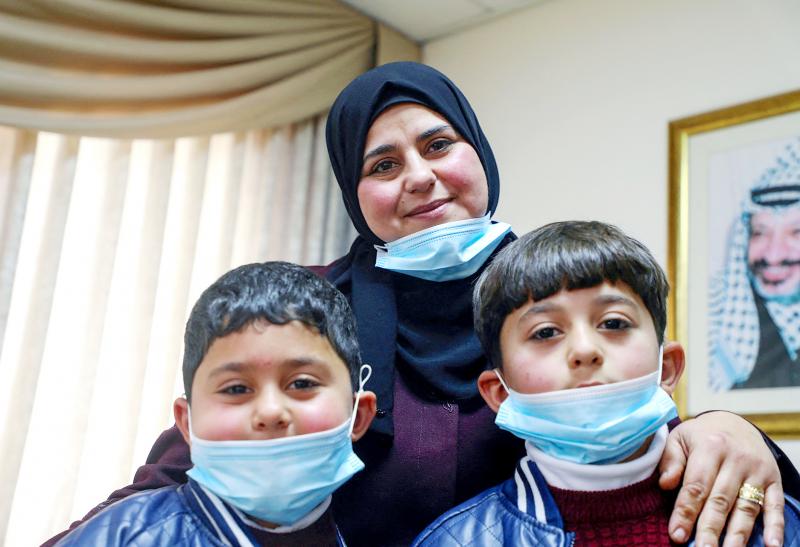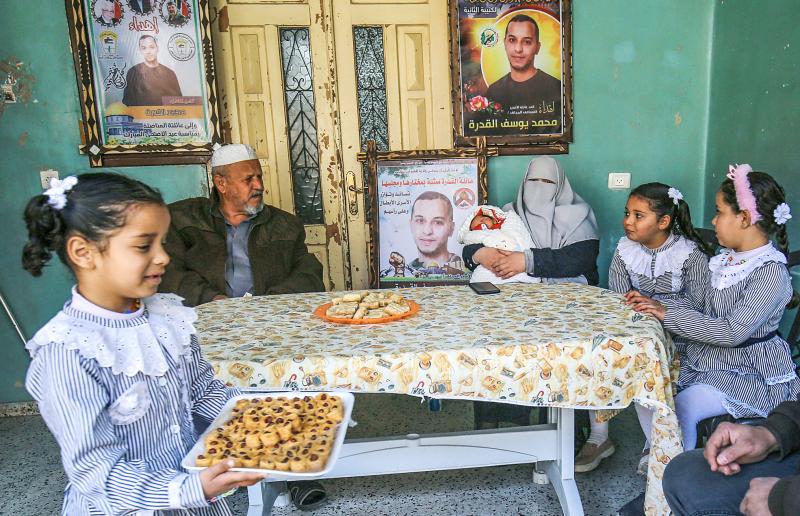Cradling her newborn son in a thick white blanket on the patio of her Gaza home, Iman al-Qudra knows it will be years before her baby boy, Mujahid, meets his father.
Her husband Mohammad al-Qudra has been imprisoned in Israel since 2014, and for Iman to get pregnant his sperm had to be smuggled out of jail to be used in an in-vitro fertilization (IVF) program.
Iman is one of several Palestinian women in the Israeli-blockaded Gaza Strip and occupied West Bank who in recent years have turned to IVF using sperm from an imprisoned husband.

Photo: AFP
It is a complex endeavour — Israeli prison officials voiced doubt it was even possible — and success is not guaranteed. For the Qudras, another Palestinian, who was being freed from the same prison in southern Israel where Mohammad is held, had to first agree to smuggle out the semen on the day of his release. He then had to swiftly get it past the Gaza Strip crossing, tightly controlled by Israel. Next came Iman’s IVF treatment, and then an anxious wait to see if it had worked. A specialist in reproductive health at the University Hospital of Toulouse (CHU), Louis Bujan, said it was “plausible” for sperm to remain viable during such a journey, regardless of refrigeration conditions.
“It all depends on the quality of the sperm from the start,” said Bujan, adding semen can be held in a container for more than 24 hours and remain viable.
‘I WANTED A BOY’

Photo: AFP
After three attempts, Iman conceived last year, five years after last being given permission to see her husband during a prison visit. “I was afraid of being too old for another pregnancy by the time my husband was released,” she said, surrounded by her three daughters, all conceived before Mohammad’s imprisonment.
“I wanted a boy,” she said, which an IVF treatment allowed her to choose. Specialist Abdelkarim al-Hindawi performed the procedure in Gaza City, where he said he has carried out several fertilization of prisoners’ wives.
“Usually the sperm arrives hidden inside a pen or a small bottle, passed (secretly) during visits,” or sneaked out by a freed cellmate, he said. “It has to be here within 12 hours, or it will no longer be viable,” he said, adding the semen is then frozen for preservation at the clinic.
Each attempt costs US$2,000, a huge sum in poverty-ridden Gaza, which has been under an Israeli blockade since 2007 when Hamas Islamists took power in the territory. The peeling walls of the Qudras’ home in Khan Yunis, southern Gaza, are covered with portraits of Mohammad, looking youthful in contrast to his dated weapon and military uniform. A member of Hamas’s armed wing, Qudra was captured by Israeli forces during the 2014 war in Gaza and later sentenced to 11 years in prison for belonging to the movement, said Iman.
Salaheddine and Muhannad Zibn, who live in the northern West Bank, have only met their father once, during a prison visit when one was five years old and the other just two weeks, said their mother Dalal. She said her children were the first conceived via IVF from a father detained in Israel, a claim supported by the Palestinian doctor who performed the procedure, Ghosson Badran.
“I am very proud to be the first because it is our right to have children,” she said. “I gave hope to many women.” Her husband Amar has been serving a life sentence for planning anti-Israel attacks for Hamas since 1997, Dalal Zibn said.
When her husband first proposed IVF, she said: “I did not understand the concept Then he convinced me and the doctors reassured me.”
Like Qudra, Dalal Zibn had daughters before her husband was jailed. In 2012 she decided to try IVF, in the hopes of having sons.
NO QUESTIONS ASKED
The Israeli Prisons Service (IPS) views the stories of sperm-smuggling with skepticism.
“We have no information or evidence to support these allegations,” IPS spokeswoman Hana Herbst said, characterizing them as “rumors.”
“We do not know how it is possible to pass sufficient semen for a medical procedure,” she added.
But the Palestinian Prisoners’ Club, a West Bank-based rights group, estimates 96 babies have been born in this way to jailed fathers.
Many came from procedures performed at the Razan Centre in Nablus, which only accepts older women or those whose husbands have long sentences, Badran said.
Prisoners’ wives at Razan are treated for free. But verifying the donated sperm is from the jailed husband is delicate, and Badran said sworn statements from both sides of the family are required before IVF attempts.
“We don’t know how they get it and we don’t ask them any details,” she said.
While many patients see it as a “victory” over Israel, the medical team is trying to stay “out of politics,” Badran said.
Hindawi, the Gaza doctor, said he does not ask questions either. “It’s not my job. Usually no one asks about the DNA because there is trust, because it’s the wife who brings it,” he added.
But for young Muhannad Zibn only one thing matters. He says he is longing to see his dad, “to hug him and especially go and buy toys with him, like the other kids.”

Words of the Year are not just interesting, they are telling. They are language and attitude barometers that measure what a country sees as important. The trending vocabulary around AI last year reveals a stark divergence in what each society notices and responds to the technological shift. For the Anglosphere it’s fatigue. For China it’s ambition. For Taiwan, it’s pragmatic vigilance. In Taiwan’s annual “representative character” vote, “recall” (罷) took the top spot with over 15,000 votes, followed closely by “scam” (詐). While “recall” speaks to the island’s partisan deadlock — a year defined by legislative recall campaigns and a public exhausted

Hsu Pu-liao (許不了) never lived to see the premiere of his most successful film, The Clown and the Swan (小丑與天鵝, 1985). The movie, which starred Hsu, the “Taiwanese Charlie Chaplin,” outgrossed Jackie Chan’s Heart of Dragon (龍的心), earning NT$9.2 million at the local box office. Forty years after its premiere, the film has become the Taiwan Film and Audiovisual Institute’s (TFAI) 100th restoration. “It is the only one of Hsu’s films whose original negative survived,” says director Kevin Chu (朱延平), one of Taiwan’s most commercially successful

In the 2010s, the Communist Party of China (CCP) began cracking down on Christian churches. Media reports said at the time that various versions of Protestant Christianity were likely the fastest growing religions in the People’s Republic of China (PRC). The crackdown was part of a campaign that in turn was part of a larger movement to bring religion under party control. For the Protestant churches, “the government’s aim has been to force all churches into the state-controlled organization,” according to a 2023 article in Christianity Today. That piece was centered on Wang Yi (王怡), the fiery, charismatic pastor of the

The primaries for this year’s nine-in-one local elections in November began early in this election cycle, starting last autumn. The local press has been full of tales of intrigue, betrayal, infighting and drama going back to the summer of 2024. This is not widely covered in the English-language press, and the nine-in-one elections are not well understood. The nine-in-one elections refer to the nine levels of local governments that go to the ballot, from the neighborhood and village borough chief level on up to the city mayor and county commissioner level. The main focus is on the 22 special municipality